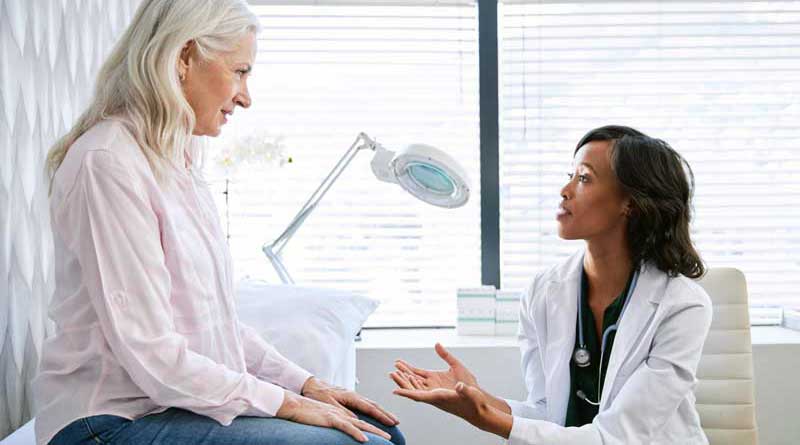
Podcasts are an effective format to reach busy residents
– By Jill Pope, Senior Technical Writer/Editor
Women aren’t getting the menopause care they need, and there are a few important reasons why. First, national surveys suggest that at least one-third of women with menopause-related symptoms, such as hot flashes and night sweats, either delay or don’t seek care. That leaves about two-thirds of women who actually discuss menopause with their doctor. Second, doctors commonly report that they don’t have enough time to address these issues with patients.
A third barrier—and one that a current study at the Kaiser Permanente Center for Health Research (CHR) will address—is that doctors may not be comfortable with discussing treatment options, particularly hormone therapy.
For nearly 20 years, the results of the 2002 Women’s Health Initiative (WHI) study have guided hormone prescribing practices for women with symptoms of menopause. That landmark study found that postmenopausal women taking combination hormone therapy (estrogen and progestin) had an increased risk for breast cancer, heart disease, stroke, and blood clots. Understandably, the results led many women to stop taking hormone therapy.
New evidence supports a practice change
More recent evidence, however, supports the safety of hormone therapy for women who are going through the menopausal transition or are within 10 years of their last menstrual period. But that information hasn’t reached doctors, because most medical residency training programs don’t cover menopause. “One reason that women are not treated for menopausal symptoms is a lack of clinical education on the topic,” says Dr. Kim Vesco, MD, MPH, a Senior Investigator at CHR and a practicing obstetrician/gynecologist at Kaiser Permanente Northwest (KPNW).
The most effective treatment for women who are having hot flashes and night sweats, Dr. Vesco explains, is systemic hormone therapy, if a patient does not have contraindications. The newest guidelines from the North American Menopause Society and the Endocrine Society state that hormone therapy may be safely prescribed to improve quality of life related to menopausal symptoms for women younger than age 60 or within 10 years of menopause. Yet because health care providers lack up-to-date knowledge on the topic, Dr. Vesco says, most hesitate to prescribe hormone products.
Study will use podcast to reach busy residents
Through a study Dr. Vesco is co-leading with Amanda Clark, MD, MCR, NCMP, a urogynecologist and menopause physician at KPNW and an Affiliate Associate Professor at Oregon Health & Science University (OHSU), these women are providing the menopause education residents aren’t getting in their training programs—and they’re doing it using a podcast.
Drs. Vesco and Clark proposed the podcast study in response to a call for studies to test curricula for resident training in menopause. They settled on the podcast format as a good way to reach residents, who often work 80 hours per week, and don’t have time to read. According to a 2019 CBS News poll, 29% of people ages 18-34 report listening to podcasts at least a few times a week. Drs. Vesco and Clark are leading the first CHR study to create a podcast. And to their knowledge, they are also creating the first podcast to educate residents about menopause. Dr. Clark notes, “All women experience menopause as a normal life transition and most have bothersome symptoms. We want to make sure that doctors possess the knowledge and confidence to offer effective treatments as necessary.”
How will we know if the podcast works?
The study is creating six podcast episodes that present up-to-date evidence and clinical information in the form of a conversation between Drs. Vesco and Clark, the study co-leads, and Tovi Anderson, MD, a KPNW Family Medicine physician. Using an approach called the flipped-classroom design, the study will deliver the podcast episodes prior to an in-class experience for residents.
Each 15-20 minute podcast episode uses dialogue and case presentations to cover issues such as use of hormone and nonhormone therapy for hot flashes, treating menopausal symptoms in women with breast cancer, and identifying and treating the genitourinary syndrome of menopause—a group of genital and urinary symptoms that affect about half of post-menopausal women.
After residents listen to the podcast series, the study will survey them to find out whether their knowledge, comfort, and confidence levels in caring for menopausal and postmenopausal women have improved. The study will target 132 residents in Internal Medicine, Family Practice, and in Obstetrics and Gynecology at OHSU.
If the podcast is effective, the research team plans to share the curriculum widely. The resource can then be adopted by other residency programs. The podcast will be available for download from a variety of popular podcast hosting sites.
This study is funded by a Pfizer Grant for Independent Learning and Change. Podcast episodes were recorded and produced by Carl Jameson at Craftmaster Productions.